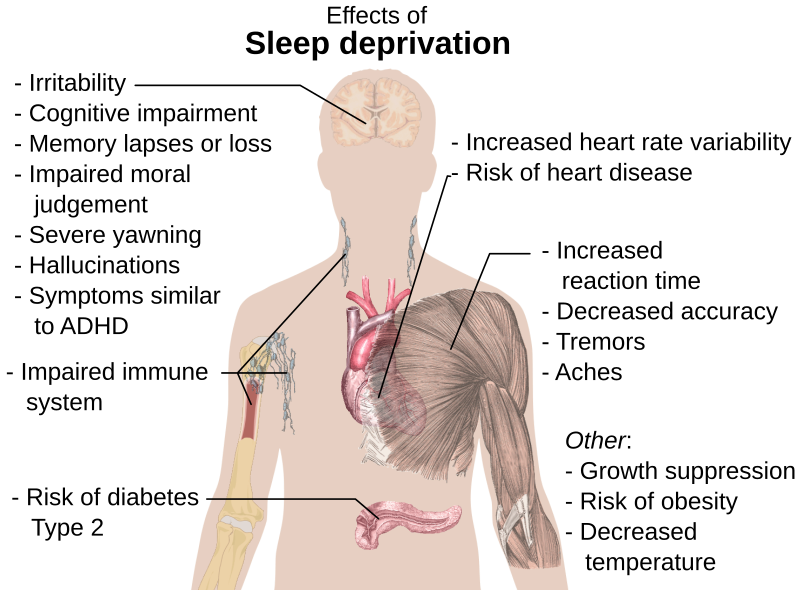Intelligence and Mood Disorders
Sleep deprivation is pretty common these days—information technology's a major attribute of achievement-oriented societies—simply why would anyone accept a love-hate relationship with it? Usually, i would say,slumber impecuniousness and all the accompanying symptomsare the definition of a honey-detest relationship, to the core.
Let me tell you lot something: you lot canuse sleep impecuniousness for your own benefit. We'll get into how this works, but starting time, let's talk over the miracle of slumber, sleep deprivation and its symptoms, and finally blueprint a "how to" experiment about sleep deprivation(usually known equally cocky-torture), and inquire ourselves, more chiefly, why?
Sleep: Functionality
"Sleep is a naturally recurring state characterized by reduced or absent consciousness, […] and inactivity of nigh all voluntary muscles." (Macmillan, 1981). This is a short and articulate explanation:
- sleep is characterized by sleep stages/cycles (five cycles, differing in depth)
- the deeper your slumber, the ameliorate the quality of slumber
- More Sleep ≠ Amend (good for you avg. 7.five-9 hours)
The functions of sleep are very multifaceted and majorly unexplored, but these (validated, and usually accustomed) aspects involvement us the about right now. Sleep has a major impact:
- on our memory and the ability to re-organize thoughts, experiences and to learn new things (neuroplasticity)
- on the regulation of necessary hormones and the ability of our trunk to regenerate physically
What is Slumber Deprivation?
Slumber impecuniousness is the lack of sleep: either information technology was caused by a very superficial and short sleep (over a menstruum of some days) or by no slumber at all. The functionality and benefits of sleep are limited as a consequence (meet above), and we might face someserious bug, if we stay sleep-deprived for a prolonged menstruation of fourth dimension.
The effects of sleep impecuniousness are various; some occur instantly subsequentlyacute deprivation, other occur simply afterchronic deprivation:

(past Mikael Häggström, Wikimedia Commons, 2009)
After acute deprivation:
- irritability
- cerebral impairment
- memory lapses
- restricted judgement
- severe yawning
- increased center-charge per unit variability, increased reaction fourth dimension and decreased accuracy
- temporary emotional instability
Later chronic impecuniousness:
The effects of chronic impecuniousness boil downwardly to the development of various diseases, such as:
- Diabetes
- heart affliction
- growth suppression
- restricted immune system functionality
- weight gain/loss
- depression
Due to the variety of astute deficits, sleep deprivation has been used as a successful interrogation technique. In fact, the U.South. armed forces authorised sleep deprivation as an interrogation method (Exit no Marks: Enhanced Interrogation Techniques and the Risk of Criminality, Baronial 2007).
But hey, why would in that location be alove-hate relationship here? What'due south the do good for usa?!
How To (..and the benefits of sleep deprivation?!)
The effects of sleep deprivation on the human body were observed and analyzed in the 70s: the methodological monitoring involved blood assay, just also neuropsychological instruments to capture the brain activity during slumber-deprivation and duringrecovery sleep afterwards deprivation.
The results:"There's evidence of antidepressive upshot later on sleep deprivation."As a thing of fact, subjects experienced a37.2 % improvement in their mood!
The background of these results are diverse—the reasons behind the remarkable mood comeback are, amongst others:
- biochemical investigations proved an increase of different hormones, including serotonin and noradrenaline, which are too known to functionequally a happiness hormone (serotonin) and stimulating hormone (noradrenaline)
- improved slumber continuity and depth in the night after slumber deprivation
These mentioned furnishings take action in depressedsimply also non-depressed people,meaning that you tin stay awake for a nighttime, begin the next day every bit you unremarkably do and endeavour to go along yourself awake (that's non very easy!) and go to bed quite early → sleep similar a infant → wake upward the next morning withmore than power and energy.
By depriving yourself of sleep, youset your biological clock to zip— in instance your fourth dimension management is messed upwardly and running out of fuel, this can very helpful (a love-hate relationship). You tin call sleep impecuniousnesssleephacking: at first nosotros abjure from slumber, and later (during the recovery night) we slip into a very deep state of sleep, which will regenerate us.
Admittedly, sleep impecuniousness amid good for you people is often met with skepticism, mainly because healthy subjects can regulate their sleep pattern in other means (through nutrition, sleep hygiene and slumber rituals). On the other paw, sleep deprivation is free of whatever serious side furnishings and tin can serve equally a quick fix. Here's a curt how-to:
- Perform your slumber deprivation "experiment" on the weekend (working in a sleep deprived state can be difficult)
- Keep yourself awake during your slumber deprivation night (and the following 24-hour interval) with the aid of tea or coffee, but delight don't overdo it
- Go to bed early on your slumber-deprived day, and bask your deep recovery night (vii.5 – 9 hours)
- Wake up powerful and energized, feeling like a million dollars
After your slumber deprivation experiment y'all should take intendance of a well-counterbalanced diet and skilful sleeping habits—do not regress to onetime, negative tendencies. Slumber deprivation for a dark tin be practical easily, is highly effective and complimentary of serious side effects. Have you already tried it? Share your experience with us!
Featured photo credit: Lux Graves via unsplash.com
Source: https://www.lifehack.org/456980/mood-disorders-are-linked-to-higher-intelligence-science-says
0 Response to "Intelligence and Mood Disorders"
Post a Comment